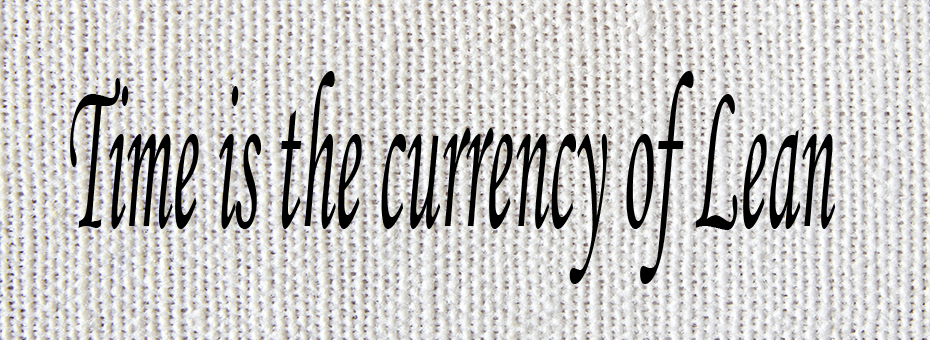The first book that I read about the Toyota Production System (TPS) was Kaizen by Masaaki Imai. In this book he quotes Taiichi Ohno, generally considered to be the “father” of the TPS (now referred to as Lean), as being determined “to eliminate all forms of waste”.
He lists the classifications of waste as articulated by Ohno to be:
- Overproduction
- Waste of time spent at the machine
- Waste involved in the transportation of units
- Waste in processing
- Waste in taking inventory
- Waste of motion
- Waste in the form of defective units
When I first read “eliminate all forms of waste” my accounting oriented brain interpreted that as “reduce costs”. I labored under that misconception for years. But at one point I took a trip to Japan with a group to study Target Costing. During one of the social hours I had a conversation with a Sensei and he explained that when Toyota uses the word “waste”, it doesn’t refer to “cost”, but to “time”…with the objective of eliminating all activities that don’t add value for the customer in order to reduce lead-time.
Lean is a time-based strategy that uses time to gain competitive advantage. For every improvement in time that we achieve by eliminating time wasting activities, we gain competitive advantage, and reduced cost by growing our business using our newly discovered “free time”.Reducing lead-time does two things. First, it enables you to do things for the customer that competitors can’t do. Most companies’ lead times are measured in weeks (as were Wiremold’s), but if you can service the customer in days, that gives you a competitive advantage. Second, by eliminating non-value adding activities you free up capacity to do more value and add work (i.e. grow) with the same resources.
That conversation represented one of the “aha” moments during my lean journey. I now understood Ohno’s list of seven wastes differently. Although the word “time” is used explicitly in only the second waste, it’s actually at the core of the other six as well.
- Overproduction means spending time to make things customers don’t currently need.
- Transportation means spending time to move units from point A to point B without adding any value to the units.
- Processing, or more specifically over-processing, means spending time on activities that don’t add value.
- Taking inventory, and making inventory, ties back to the first waste…spending time making things that customers don’t currently need, requiring storage and accounting for inventory.
- Motion means operators spending time on unnecessary movement because the distance between operations is more than it needs to be.
- Making defective units means spending time making units that either have to be scrapped or require more time to be reworked.
Every one of the seven wastes adds to lead-time, which hurts the customer and incurs unnecessary costs in terms of people and machine time.
Lean is a time-based strategy. It uses time to gain competitive advantage. Once I understood this I started saying “Time is the currency of Lean”. For every improvement in time that we achieve by eliminating time wasting activities, we gain competitive advantage, and reduced cost by growing our business using our newly discovered “free time”.
Every process has an output and that output is in one of three states at any given time…being worked on, waiting to be worked on, or moving from one place to another…usually in order to wait to be worked on. Most processes spend less than 10% of the elapsed time on value-adding activities. So, if we want to reduce lead-time, the fastest way to do that is to focus initially on the two states when no value added work is taking place…waiting and moving. Most improvement teams want to focus on the work because that is what is most visible. But, even if we improve the “work” time by 50% that improves lead-time by only 5%, at most. If we can eliminate waiting and moving we can quickly get significant gains in lead-time.
Why does Toyota focus on time? I believe it is because they realized that of all the resources needed to produce anything, the only one that is finite is time. There are only 60 minutes in an hour, 24 hours in a day and 365 days in a year. Never more (don’t bug me about leap year, please). So, although we can buy more machines and hire more people, we can never increase the amount of time.
I recently read an article by George Gilder in which he explains his “Information Theory of Economics”:
Wealth = Knowledge
Growth = Learning
Money = Time
In The Lean Sensei, the authors argue that:
“Lean is not a production system, it’s an education system. The ‘TPS’ name itself is unfortunate and misleading as it suggests this is a collection of production practices to copy. Indeed, some Toyota veterans have told us they prefer to call it the Thinking People System. The trouble is that, many people think they can replace their current practices with the ‘best’ practices of the TPS. They fail to understand that the TPS evolved as the sum of responses Toyota discovered as it faced specific obstacles. Rather than a system of practices, Toyota engineers came up with a system of learning: a way to discover problems and resolve them. The aim is not to replace one’s own production system by Toyota’s (which doesn’t make much sense when you think it through), but to use the TPS to improve your own productions system by teaching better thinking – everyone, everywhere, every day.”
In other words, the principles of TPS are universal, but the application is local.
If we combine all of this we get:
- Lean is a learning system that provides for growth with existing resources.
- Accumulated knowledge gained from continuous learning creates wealth.
- Time is the only finite resource that we have. We can either use wisely, thereby saving money, or not, resulting in wasting money.
At the bottom of this pyramid: It’s About Time





